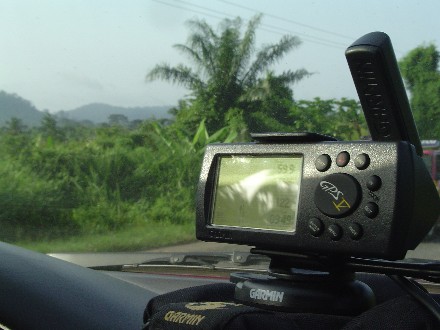
George, our trusty GPS
This Month's Features:
On the Road Again
Traveling throughout Southern Ghana
to do training.
Halloween in Accra
Click to jump directly to Halloween pictures.
Patriarch Joseph William Billy Johnson
Click to jump directly to Patriarch Johnson.
As many of you know, Elder Markham loves to drive, especially on "interesting roads," sometimes called trails. In contrast, Sister Markham will barely tolerate a short trip on a smooth freeway. Well, this month the Markhams did training for Stakes and Districts outside the Greater Accra Area. Elder Markham got his wish, and Sister Markham turned into a real trooper. Who says the age of miracles is past!

George, our trusty GPS
We can not find a reliable road map of Ghana. Ghanaians don't read maps well. We are sure these two statements are facts, but which one is the cause, and which one is an effect is a chicken and egg question. We brought a handheld Global Positioning System on a whim while packing. It has become a very dear friend. We don't always know where we are or how to get where we need to be, but with George's "breadcrumb" trace we always know the way back! There is a very rough map of Ghana in George, so he can give some navigational clues. We tell Ghanaian Church members who sometimes ride with us that it is a Liahona. They are amazed by the GPS technology. Ghanaians DO know how to GET places, and they are always willing to help with directions.
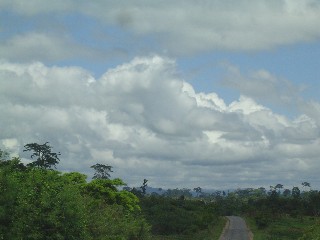
|
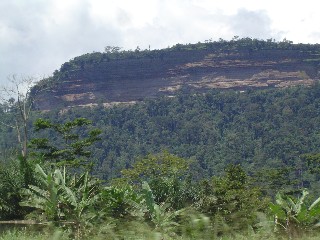
|
|
There are beautiful jungle forests in most of Southern Ghana. |
There are mountains not far to the north of Accra. |
The distances involved for our travel are not great. Everywhere we go is less than 200 miles by road from Accra. The relevant questions are always, which road, and what is the condition of the road??
Click here for a map and brief list of our trips
Travel in Ghana requires realtime multi-tasking. These pictures may help you understand.
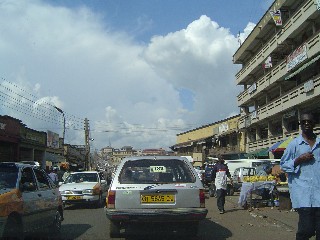
|
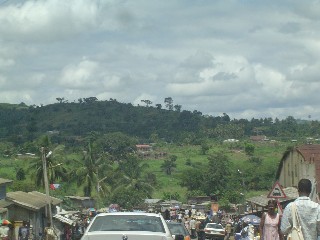
|
| We see large cities and... | ...quaint villages. |
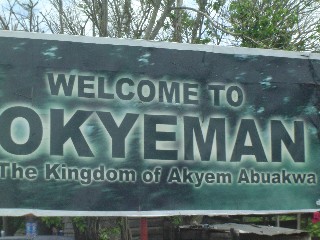
|
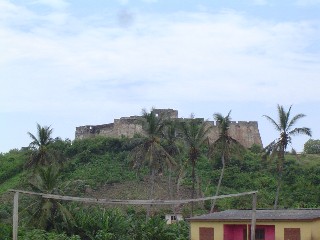
|
| There are real Kingdoms... | ...and ancient castles on hills. |
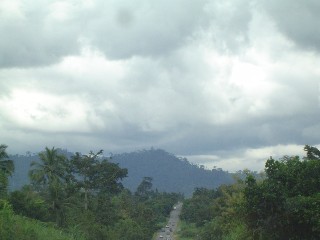
|
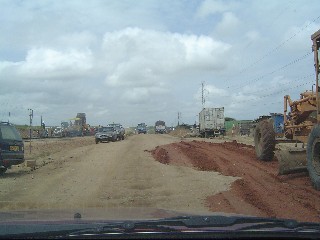
|
| We must deal with highway traffic... |
...and road construction (destruction in some cases!) |
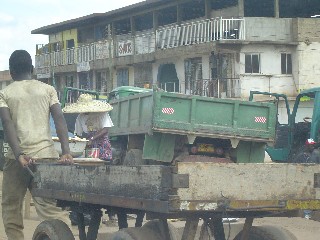
|
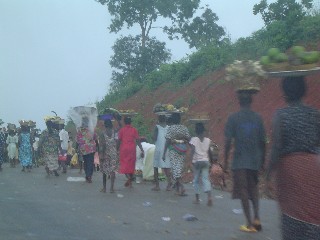
|
| We share the road with hand carts... |
...and hawkers. These women are moving back to the front of a construction traffic stop. |
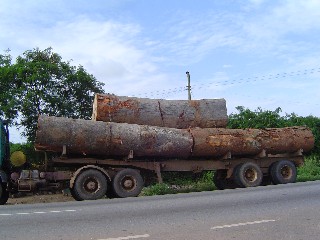
|
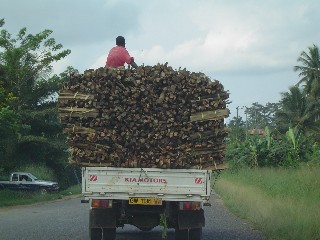
|
| There are long loads... |
...and wide loads. These riders on top often direct traffic around the slow moving truck. Would you trust your life to someone who rides there? |
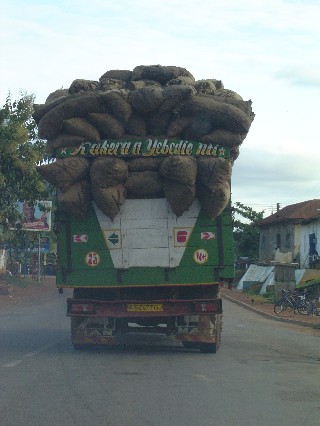
|
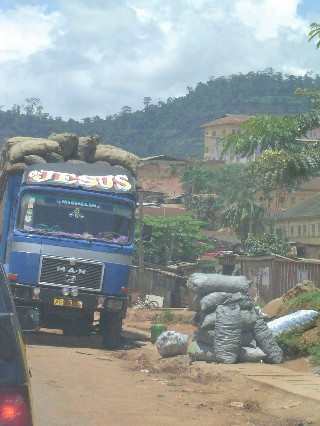
|
| There are slow trucks... |
...and slower trucks. These trucks are picking up loads of charcoal made in the villages, then hauled to the cities for fuel. |
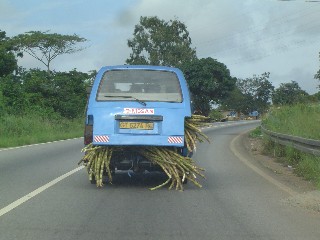
|
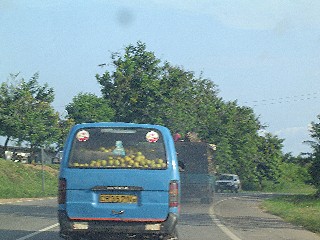
|
| Tro-Tros are overloaded with sugar cane... |
...and with oranges. (Not to mention people.) |
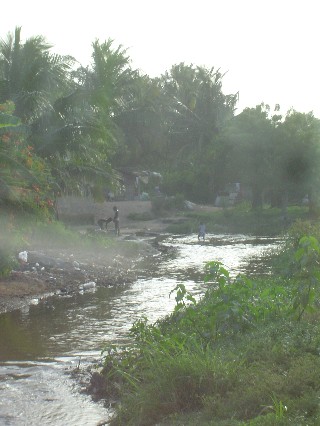
|
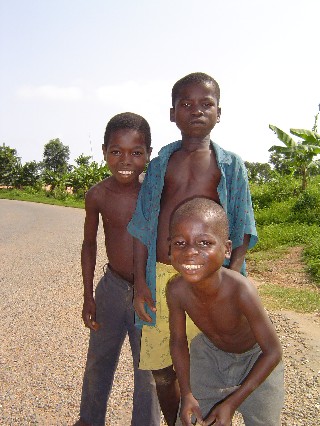
|
| We see "National Geographic" sights... |
...and creative road repair crews. Kids put dirt and sticks in potholes (or at least pretend to), then frantically signal for us to stop and pay them. |
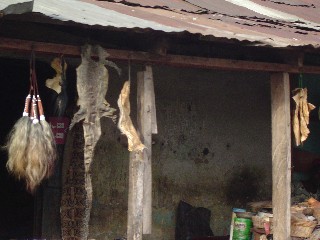
|
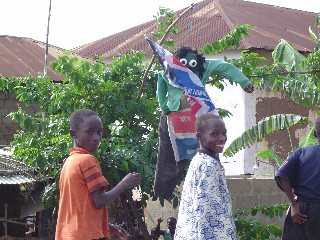
|
|
We see an occasional pharmacy for native doctor medicine... |
...and some political commentary. (The flag around the dummy is that of the current president's party.) |
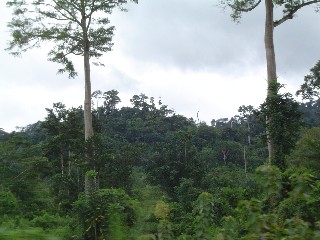
|
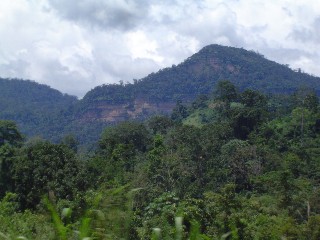
|
| See why we think the jungles... | ...and mountains are peaceful and pretty! |
When we arrive at a new city we have very good luck finding the LDS chapels. This is because they are generally beautiful, new buildings in prominent locations. President Hinckley spoke of the Church's building program in the latest conference. He said we mass produce attractive, functional buildings from a tried and proven design. It is inspiring to see this happening in Ghana. The Church has developed an excellent building design for West Africa and finds good locations to place them. The result is buildings that bless the members who use them and are landmarks in the communities.
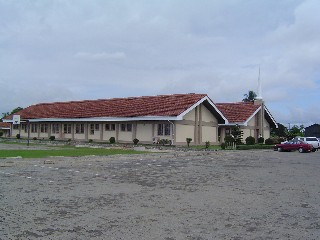
|
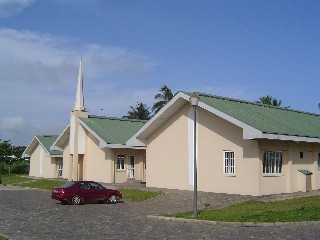
|
|
Takoradi Stake Center Low res web picture makes the pavers brick parking lot look rough--it is not. |
Ola Ward Chapel in Cape Coast The back building is an insititute for Cape Coast University students. |
The building design has center courtyards. This allows ventilation through easy open, louvered windows in every classroom. There is only A/C in the Bishop's offices. There are ceiling fans in the chapels, cultural halls and classrooms. Some windows are screened. Most surfaces are hard (no padded pews or carpets) for easy cleaning duing the annual dust storms off the northern deserts. And the restrooms are nice!
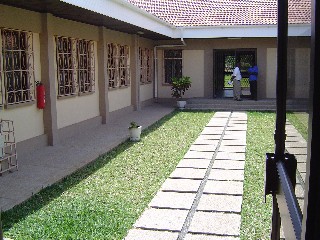
|
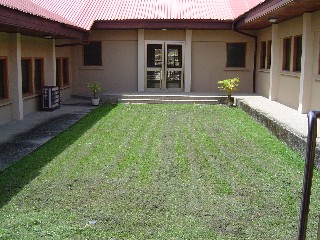
|
|
The courtyards look nice and provide critical ventilation for all rooms. |
They are convenient for visiting after meetings, or taking a short cut around crowded hallways. |
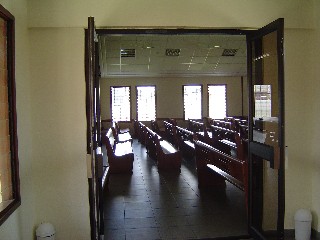
|
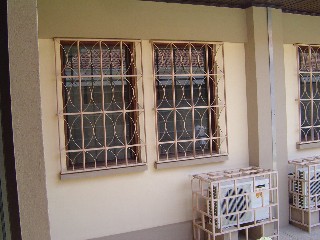
|
|
Pews in the chapels are not anchored, but the heavy wood construction prevents them from sliding easily. |
The Bishop's office is air conditioned. They always ask us to use it when we do audits! |
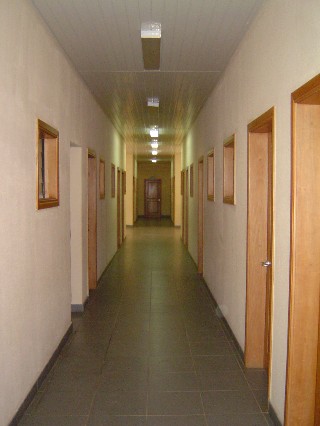
|
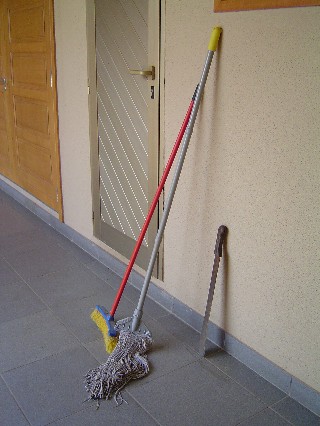
|
|
The big difference between the Church's design and a rented building is teaching stations. These buildings allow the full Church program. Notice windows to the hallways for ventilation. |
The custodians and members are proud of their buildings and it shows in the care. Machetes are everywhere; it is a way of life. |
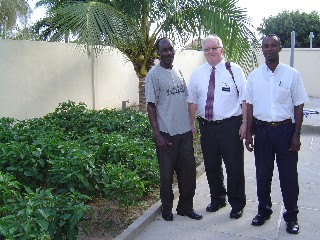
|
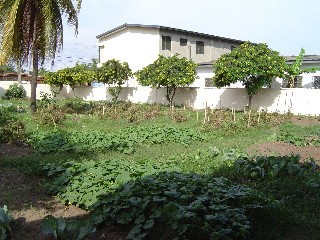
|
|
The lots are spacious, and it is not uncommon to find vegetable gardens in the back. |
This garden is at an older building now used by welfare services as an Employment Resource Center. This garden is part of a self-reliance skills program. |
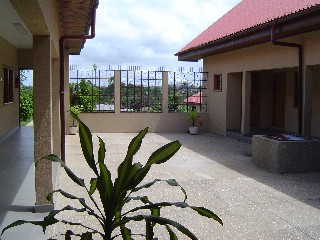
|
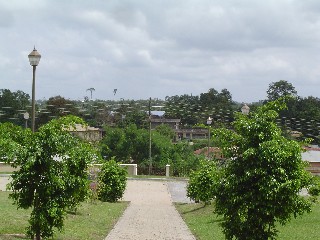
|
|
The buildings are often on hills where they have beautiful views and are easily seen by the community. |
Getting directions is a snap. Almost everyone knows where the LDS Church is. |
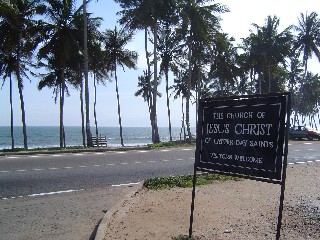
|
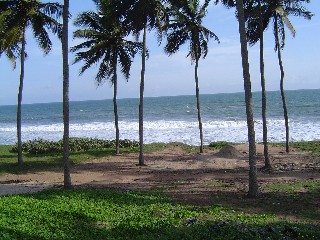
|
|
These simple black and white signs are in front of each building and usually at the nearest intersection of a main road. |
Yes, you noticed this chapel is just across the street from a beautiful beach! The Sunday School President has his work cut out keeping the youth in class. |
Isaiah taught, "Behold, I will lift up mine hand to the Gentiles, and set up my standard to the people: and they shall bring thy sons in their arms, and thy daughters shall be carried upon their shoulders. And kings shall be thy nursing fathers, and their queens thy nursing mothers...for they shall not be ashamed that wait for me." (Isaiah 49:22-23) We are seeing how tithes from areas where the Church is more established are building the facilities here as the Church grows so quickly. In a generation or two, the tithes from West Africa may be building facilities in the Middle East or China. New Saints in high growth areas are being carried on the shoulders of faithful church members from areas where the Church is more mature. If you fall into that latter catagory, feel good about what you are doing.
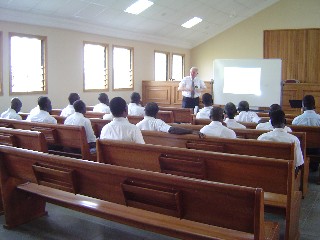
|
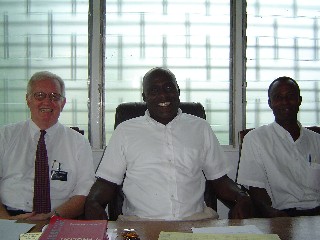
|
|
The gold at the end of the rainbow is the time we spend teaching. Here Elder Markham leads a session on church financial and audit processes. |
In the small world department, Pres. Appiah (center) of the Cape Coast Stake is the father of Thomas Appiah Jr. who was the Mission Leader in our Tokyo ward in 1999. |
Our favorite training module is one that helps clerks and auditors
see how important their roles are. To read it, click the button below.
Story of a Happy Mother
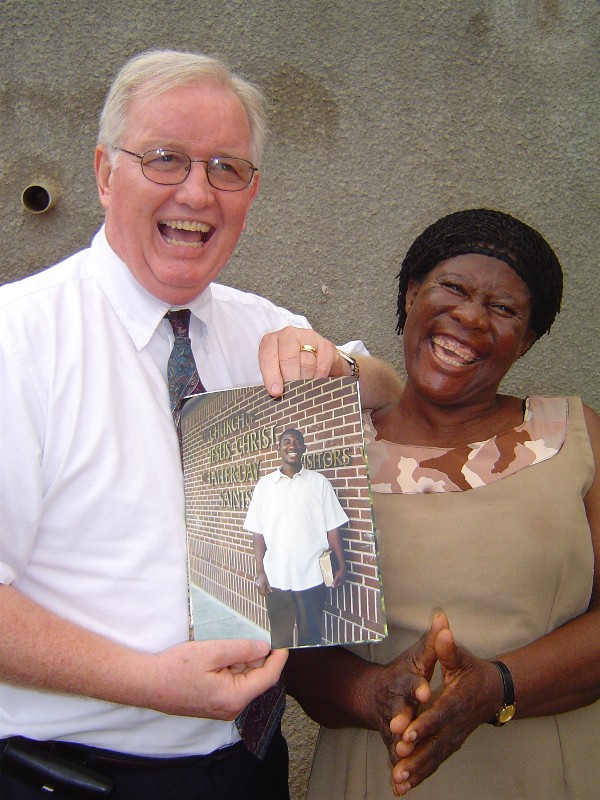
Baba's Mother, Juliana Marbell
with Elder Markham and a picture of Baba.
A few of our friends in North America have asked if we ever teach non-members. "Not much," is the answer. We were called to help build the foundation so it will be strong enough to support the wonderful growth of the Church in West Africa. But we did have one experience that is worth noting here. A young man named Baba finished a college course in Ghana and went to the US for more education and some work experience. Though he had not recently been religious while in Ghana, he met LDS missionaries in Virginia and was converted this year. He attends a singles ward outside Washington, DC, where our son, Sammie, also attends. Sammie has a soft spot in his heart for West Africans tied to having taught some humble immigrants during his mission in Italy. When we were called to Ghana, Sammie said we should look up Baba's mother. She lives in Takoradi, so as we planned our first trip there, Sammie, who is a photographer, sent over some very nice pictures of his friend Baba.
We drove to Takoradi on a Friday for training on Saturday. We had called some proselyting missionaries there ahead of time asking for them to contact Baba's mother, Juliana Marbell, and arrange for us to visit her. They did that, but on the day we were to arrive, they were summoned to Accra to be trained on the new teaching plan. We decided to try to find Juliana on our own. Since time was short, we found the Stake Center where our training would be the next day. There we asked a few members if anyone was available to help us find an address. Most were arriving for meetings, but they soon found one, a counselor in a bishopric, who was there catching up on paperwork.He, Sunny Quaicoe, volunteered to help. After a call to Juliana, Sunny guided us to her home about 10 minutes away. She was thrilled to meet us and receive pictures of her son. Inside, we talked briefly about his newly found religion---she was very pleased he had become active in a Christian faith. We introduced the Book of Mormon as a second testimony of Jesus Christ and gave her a copy so she could learn about what her son now believes. Sunny bore a short testimony and the spirit was very strong in the room. Juliana saith, "My heart is pounding, I feel like something great has come into my life." Just then the door openned and a man came in. Elder Markham thought, "Oh no, this will wreck the spirit." Juliana introduced her brother Paul who also lives there. Paul and Sunny immediately started talking. They are casual friends and were excited to get better acquainted! As we contemplated the events that put us there at that time, we felt very aware of Who it is that directs the work we are involved in. The young missionaries are currently teaching Juliana.

|
We do some other things around the office. Many of the senior missionaries have learned to use computers to do their work. Sister Walker from North Carolina is one. Sister Markham takes great delight in introducing the new computer users to genealogy on the internet. Julie's experience and skills have been well used. Some incurable cases of family historitis have been diagnosed among the senior missionaries in Ghana! |
|
Sister Markham with Sister Walker and the internet. |
| In his former life, our good friend, Elder Skelton, was Chief of Police in Hull, England. Here Elder Markham is getting help from the Chief to analyze handwriting on some audit forms. This is mostly to decipher the words, but sometimes it reveals that to make a deadline, some individuals try to do everything, leaving out the intended checks and balances. There is training to do here! |
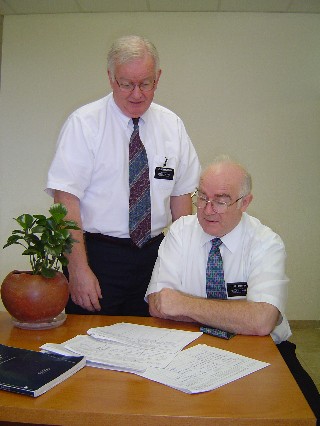
|
| Elder Skelton, handwriting analysis expert |
Sister Markham continues to look for plants, flowers and trees that are beautiful. We don't know the names of many, but we always stop for a good picture.
To enjoy the plant life Sister Markham found this month,
click on the button below.
As we drive through the villages on Saturday, we see many people attending funerals. We mentioned in an earlier website update that it is common to keep the deceased in cold storage for several weeks to allow extended family and friends to join the bereaved for the funeral. Funerals and burials normally take place at the "home village," so often all attendees must travel to the location. Therefore, most funerals are on weekends in the villages. Funerals are reunions of a sort, so people are happy and active. We are often slowed by funerals that spill into the street. It is easy to recognize funeral attendees; women all wear black and red formal dresses, while the men are in black, red, bronze, and brown traditional robes.
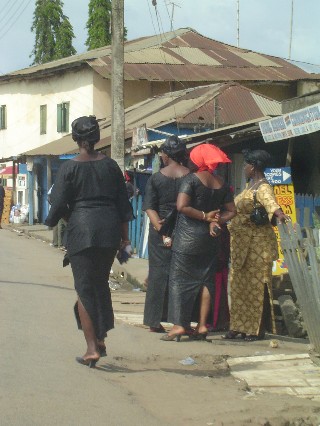
|
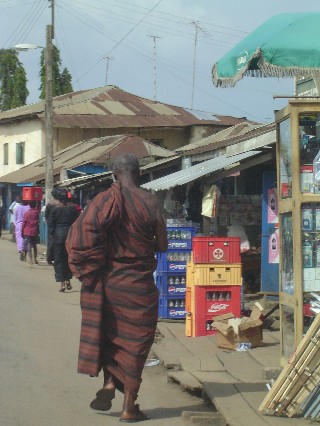
|
| Women after a funeral | A man walking from a funeral |
| Still the most impressive thing we see is people carrying heavy loads on their heads. The balance and grace is amazing. They can run and count change with their wares stacked high. They turn at the neck or whole body without a bobble. We ask friends how this skill is learned. One said that as a little boy his mother would put pineapples on his head to carry from the fields. Another explained that carrying heavy buckets of water to the house is a child's duty. They are taught that on-the-head is the healthiest way to carry the weight since they use the whole body, and one side is not stressed more than the other. |
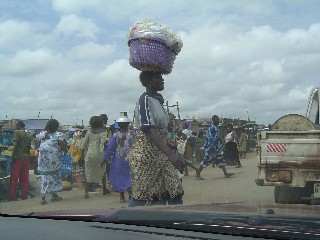
|
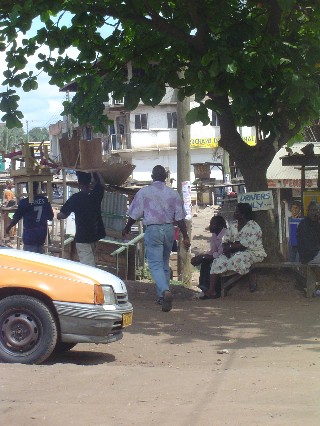
|
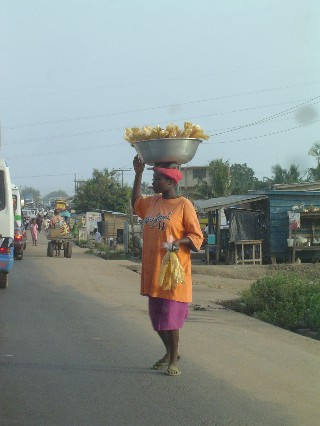
|
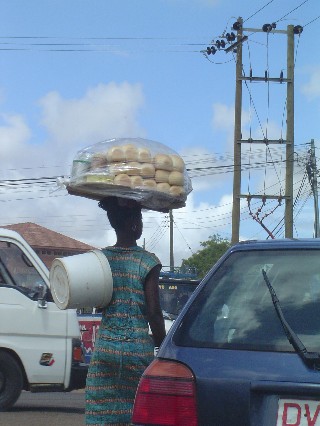
|
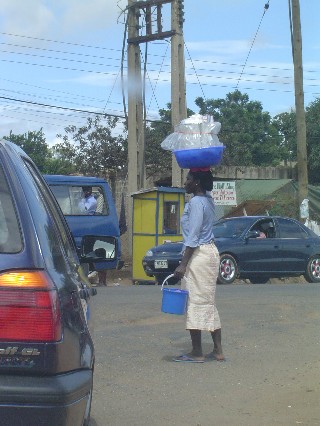
|
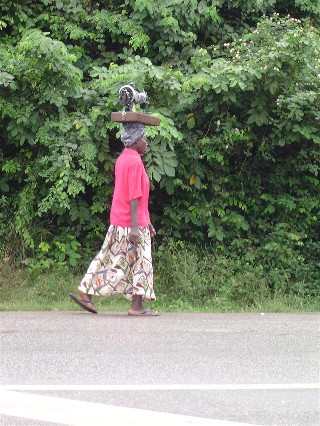
|
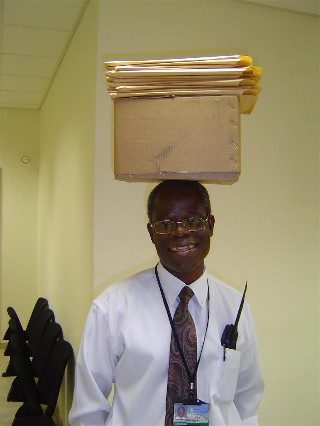
|
|
This woman walking briskly with her sewing machine on top is a favorite. |
President Buah, counselor in the Stake, and Controls Manager for the Church in West Africa, carried pineapples from the fields for his mother. |
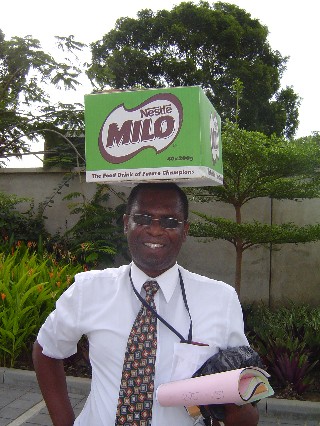
|
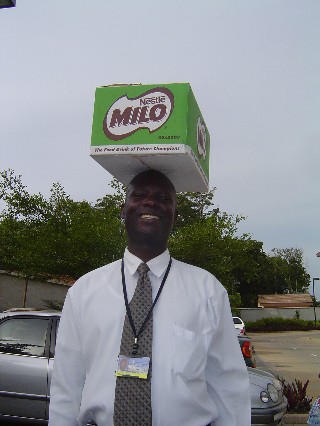
|
|
Sister Markham asked Joseph if he could carry the box he had on his head. He quickly set it on top and walked off! |
On hearing our amazement, Nicholas grabbed the box from Joseph and jeered, "anyone can do it but obrunis!" |
We work closely with the Membership and Statistical Records (MSR) group. They are fun. Recently a semi-annual planning meeting was held in Accra. Two employees from Nigeria flew in for this, as did the employee from the Ivory Coast, Wulfran. He is a classic Frenchman, called a Francophone here.
We attended lunch together one day. Charles Ajiegbe is the MSR head. He is Nigerian and speaks several languages, including French and many native languages. He chose a Chinese restaurant and ordered for all of us to save time. As we waited for the food, several of the men opened their chopsticks and attempted to hold them. We demonstrated how to use the chopsticks. It was an exercise in futility, but a fun one. Finally one man started drumming with the chopsticks, and everyone joined him. Charles observed, “This is what Africans do with two sticks in their hands!”
Elder Markham poked fun at them for failing with the chopsticks. It is acceptable to eat many dishes here without utensils, including soup. Elder Markham asked aloud, “What is a Ghanaian utensil?” He then pointed to each finger on his hand and spelled out “S-P-O-O-N.” This was met with hilarity!
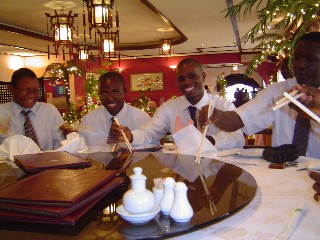
|
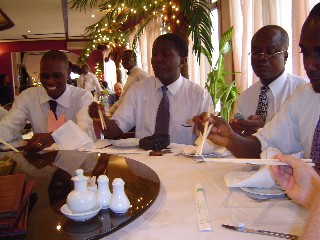
|
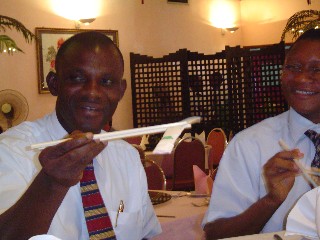
|
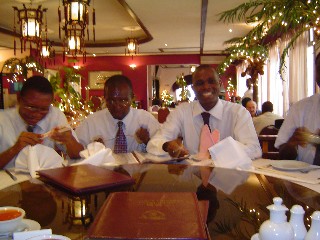
|
Later in the meal Sister Markham could not identify the meat in one of the dishes. She asked Charles what it was and Wulfran looked straight at her and said, “Sister Markham – it is DOG.” He stared without blinking. She stared back without grimacing. He then exploded with laughter! Whew! (It was beef.) This was followed by a serious discussion of which tribes in Nigeria, Ghana and the Ivory Coast eat dogs or cats.
At another meeting recently, the white controller entered the room, mostly filled with blacks. He started shaking everyone’s hand, but he started from the right and worked towards the left. We would not have noticed this except someone said, “Finally, Brother Hill, you have done it correctly!” We asked for an explanation and Joshua said, “If you start shaking hands from the left to the right, we will know you aren’t Ghanaian.”
Sister Markham replied, “So, that’s what will tip you off?”
After the laughter subsided, a discussion ensued. “What if the chief were the last one on the left, do you still start at the right?” The firm conclusion by all the Ghanaians is that you must always start from the right, always. Charles added that if the greeter made this error, a goat must be sacrificed to cover for the misdeed.
We found some fun animals this month.
Some animals also found us!
Please click the button below to see what they are.
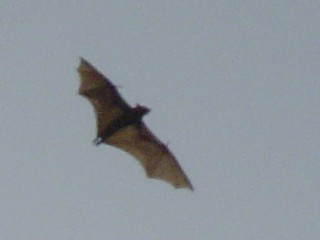
|
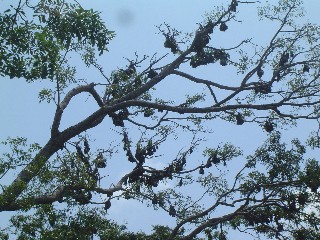
|
|
The flying foxes (fruit bats) are back just in time for Halloween! |
These bats are sleeping before going out to trick or treat. |
Click the button to learn about Halloween
in Ghana.
Top of page
Click to return to start of this update.
Visit to a Slave Castle
Ghana is home to many old forts along the coast, which are called castles. While gold brought the first European traders here, it was supplanted by slaves, which were easier and more profitable to acquire and sell. This is a sad chapter in the history of West Africa, and it is often told to remind people of their past. Several of the castles, built by former European conquerors, have been restored along the coast and are now museums to teach about African history. During our first weekend in Cape Coast we visited the Cape Coast Castle. We saw the dungeons where captured people were held before being shipped to various ports around the world. West Africans see that Americans of African heritage have a much better life than is had in West Africa. One black member of the Church spoke at a fireside for the senior temple and area missionaries. He wished that more African Americans would return to their roots in West Africa and bring with them the knowledge they have about commerce and free enterprise. He felt this could make a tremendous difference in the lives of West Africans in general. He also commented that on a trip he made to Utah, he listened to an African American member of the Church decry the slave trade that brought her ancestors to America and the subsequent discrimination she felt. He told us he admonished her to be grateful for the sacrifices her ancestors made so she could have what she had. He told her to move forward, not backwards.
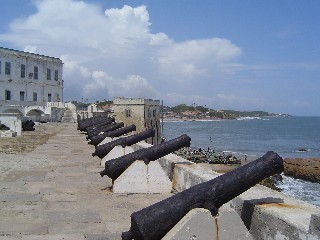
|
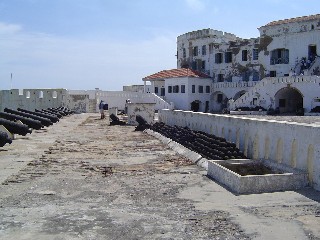
|
| Beautiful Cape Coast Castle | But there are horrible memories here |
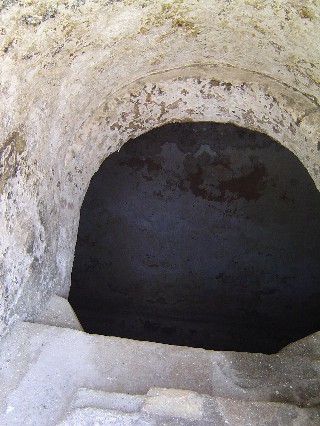
|
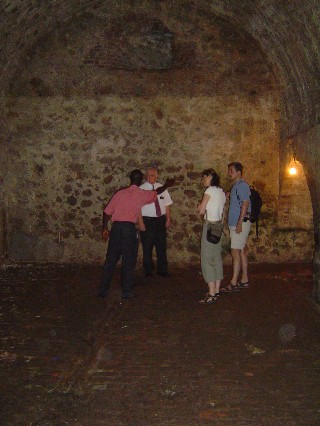
|
|
Captured people were forced into dungeons under the castle. |
Hundreds of people were held in these cells; many died. The survivers were sold as slaves. |
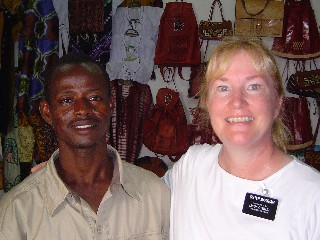
|
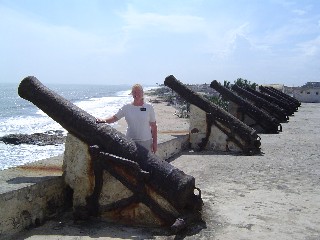
|
|
Sister Markham with a shop owner. Note the ornamental scars on his face. Until recently, this was common practice. |
Here's a contrast---some
cannons
are old and rusted, but one is young and beautiful! |
Those Blackfoot women all look alike
There are many missionaries here in Ghana. Some are proselyting, some are temple, and six couples are Area Missionaries. Included in this group is the Area Medical Director and his wife, the Area Family History Directors, the Area Public Affairs Directors, the Area Welfare Directors, the Area Presidency Executive Secretary and his wife, and us. Among the Area missionaries, this is the second mission for each couple except us and the Family History Directors. (We’ve mentioned before that many of the temple missionaries are on their fourth or fifth missions.) Of the twelve Area missionaries, three are from Bingham County, Idaho. Elder Armstrong was raised in a suburb of Firth. (Those familiar with that area may now laugh.) Sister Whisenant, nee Hamilton, is from Riverton on the outskirts of Blackfoot, while Sister Markham was raised in the city of Blackfoot – population: 8,000.
| One day, before we knew each other very well, the Whisenants and the Markhams were eating lunch together in the cafeteria. Frankly, Sister Markham was struggling with the beans, called red red (red beans cooked in red palm oil). Sister Whisenant said, “I’m a country girl. I’m tough. I can handle these just fine.” Sister Markham proudly exclaimed that she was a city girl, and that’s why she was having trouble with the beans. When they learned they were both from Blackfoot, they had quite a laugh. |

|
|
Lunch of rice, red red, chicken and fried plantains |
Perhaps you are familiar with the politically incorrect phrase, “They all look alike to me.” Sister Markham set a goal when she arrived to learn the name of each employee in the office building, but she had not previously appreciated how much we rely on hair or eye color to identify a new friend. Well, everyone here has the same color of hair, same color of eyes, and same color of skin. She has found herself staring intently trying to find something distinctive to remember about each new person and then associating their name with that. However, the Ghanaians have no comprehension of the term, “politically incorrect.” They often state, and not in jest, that we all look alike to them. We’ve been here long enough to actually see that old white men (senior missionaries) all have pale, blotchy skin and stark white hair. They do look alike! One day recently, an employee, Lydia, the head of Human Resources, raced through the double doors near our office and said, “Quick! We need a picture!” Sister Markham grabbed her camera and went to the other side of the building to take a picture of a worker at the bank next door precariously climbing a ladder balanced on a cement fence. After the photo, she asked Lydia if she just assumed that all obruni missionaries had a camera with them. Lydia said unabashedly, “Actually, I had confused you with the Public Affairs missionary. She always has a camera.” Sister Whisenant has short, curly hair and might weigh 100 pounds if soaking wet. Her younger brother, born when she was 17, graduated from high school with Sister Markham. We were both flattered with the momentary mix-up. Sister Markham has also been mistaken for Sisters Gay, Armstrong and Merrill by Ghanaians.
Mouseover to see Sisters from Blackfoot
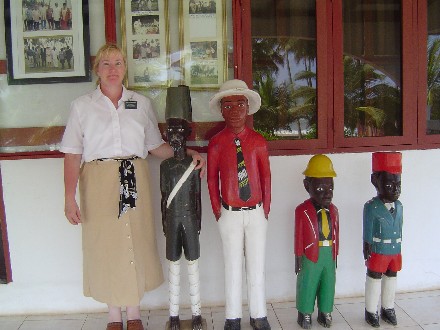
Is it Sister Markham or Sister Whisenant??
One weekend we had auditor training in Takoradi and the Whisenants were doing Public Affairs training in Cape Coast, so we traveled together. We made excellent time going and arrived early enough to enjoy lunch on the beach at the hotel we were staying in that night. Sitting on the coast, watching the Atlantic surf roll onto the beach was idyllic. Elder Markham found it appropriate to mention he’d learned that one advantage to marrying a girl from Blackfoot was that no matter where he took her, she would consider it an upgrade. That day, there was no argument.
We are not in Blackfoot anymore, Toto
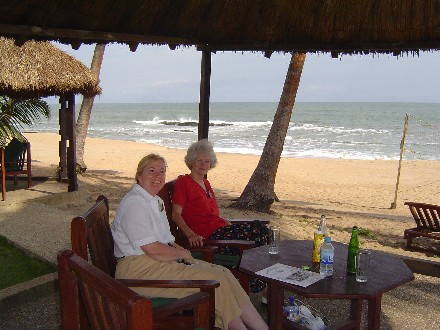
Sister Markham and Sister Whisenant
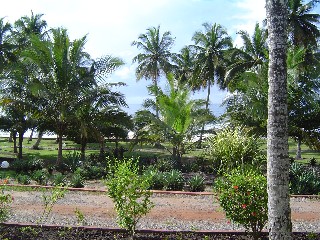
|
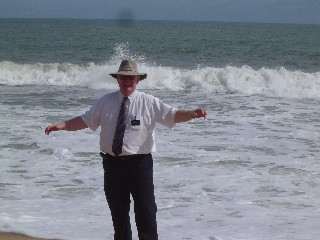
|
|
The Coconut Grove Hotel is located on the beach, about 10 miles west (toward Takoradi) of Cape Coast. |
The ocean views, gardens and beach are all very nice---to look at. |
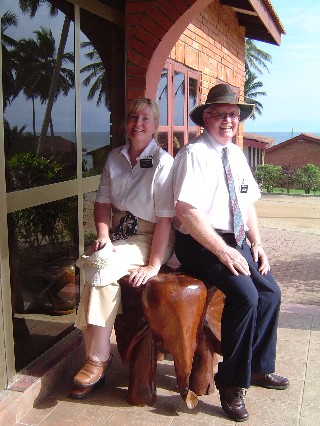
|
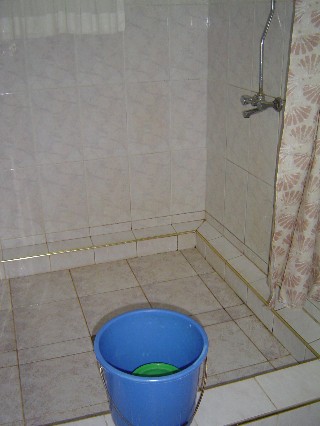
|
|
It was almost nice enough to make us forget we were in West Africa. But there were reminders. |
The rooms were very western, but there was a bucket in the marble shower. The preferred mode of bathing for West Africans is a sponge bath from a bucket. |
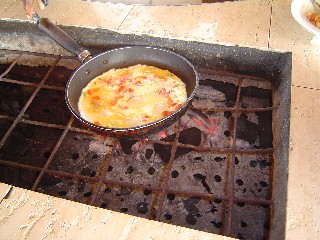 Breakfast was outstanding:
Breakfast was outstanding:Spanish omlettes cooked over charcoal, served by the ocean. |
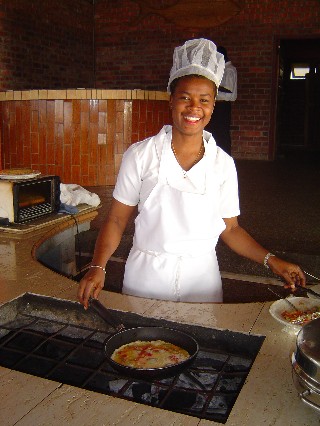
|
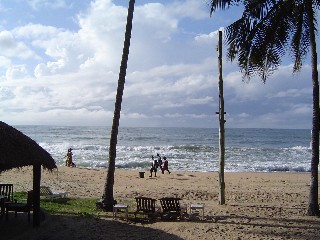
|
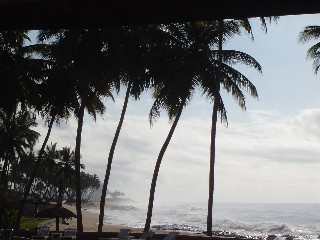
|
|
Over breakfast, we enjoyed marlevous views of the beach and ocean. |
When is the last time Sister Markham didn't have a book out during a meal! |
Things in Ghana that make us smile
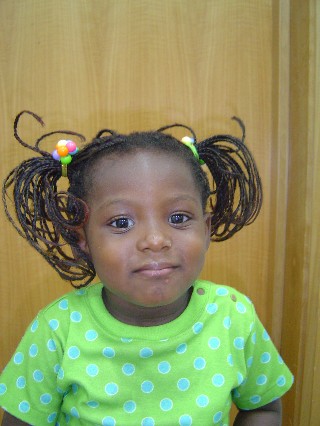
|
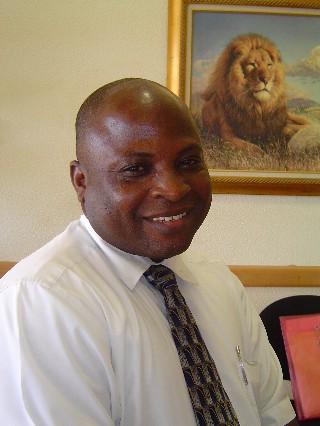
|
|
The children entertain obruni missionaries. This is Bishop Quaisie's daughter, Antoinette. She is great at 'high five.' |
Phillip Xaxagbe has a great last name. He is manager of the materials department that delivers mail to us---Sister Markham has become good friends with him! |
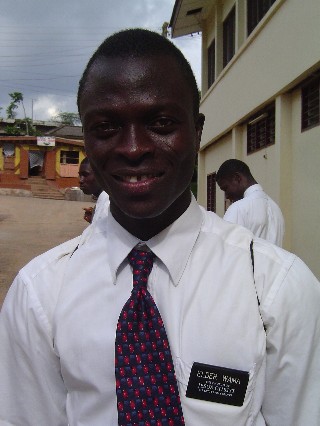
|
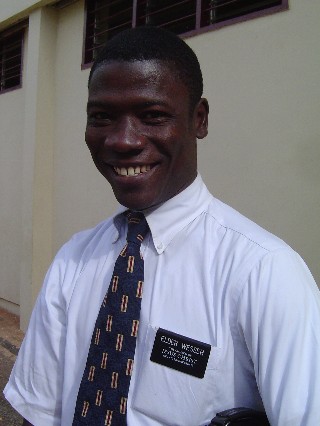
|
|
Missionaries from all over Africa serve in Ghana. They are very interesting to talk with. This is Elder Wama from Nigeria. |
These are the future of the Church and their countries. This is Elder Wessah from Liberia. |
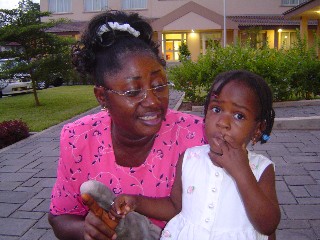
|
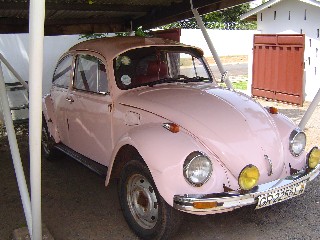
|
|
This little girl was attending the temple with her family. She was afraid of the blonde photographer! |
When we saw this pink VW in our lot we thought Tony Corbell was here from California. Not so, just someone visiting our neighbors. |
It is time for the shop/sign of the month contest.
Click below to see this month's results.
A Mission President Who Can't Get to His Mission Home
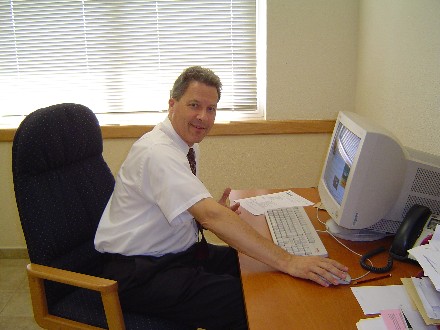
President Norby of the Ivory Coast Abidjan Mission
In early November, severe hostilities broke out between government loyalists in Ivory Coast and French peacekeepers stationed there. Over the ensuing weekend, it became unsafe for Caucasions to be on the streets in Abidjan, the largest city. The Ivory Coast Abidjan Mission includes the other French speaking West African countries of Togo, Benin, Cameroon, and Central African Republic. President and Sister Norby were in Togo just completing visits to all the missionaries outside Ivory Coast. They tried to get back to Abidjan, but there were no flights because the Abidjan airport had been closed. A Church employee drove to Togo and brought them back to Accra. From Accra, President Norby stayed in constant contact with his "sons" via cell phone and internet. He also was in regular contact with the Missionary Department in Salt Lake who contacted families and provided guidance. He had made preparations before any indication of trouble. There was one African in each companionship. Every apartment had a cell phone. Each missionary had a 72 hour kit. The missionaries stayed in their apartments and church members checked on them.
President and Sister Norby wanted to be driven to the border and have a Church employee from Abidjan meet them there and drive them back to the mission home. They were asked not to do that since the missionaries were all OK. By the end of the week, international relief organizations were evacuating foreigners from Ivory Coast. Forty-two missionaries from North America and Europe were air lifted to Accra. They came with only backpacks. Two days later a rented bus driven by two Church employees arrived in Accra with all the suitcases belonging to these missionaries. They are being assigned to temporary areas in Ghana and the other countries in the Ghana Accra and Ivory Coast Abidjan Missions.
As auditors this was not our direct concern, but Sister Markham loaned her office to President Norby for a few days (he now has an office). We were able to hear much of what went on. There was no panic. There was the calm confidence of faith. The missionaries are all safe. It is a blessing to see the Lord's servants lead through inspiration. Would we send a child or grandchild to serve in President Norby's mission---in a minute!
Patriarch Joseph William Billy Johnson
a living pioneer
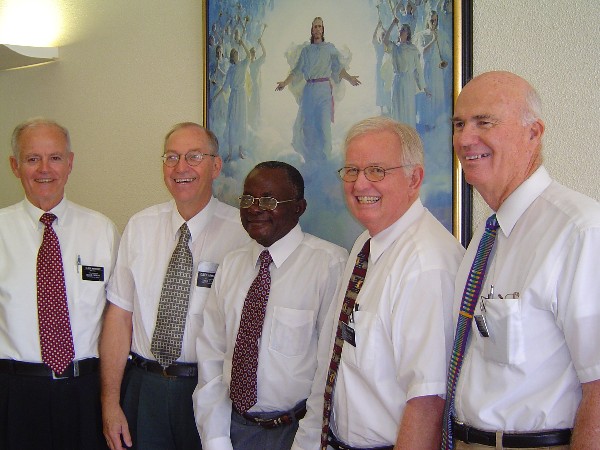
Patriarch Johnson, flanked by Elders Whisenant and Armstrong on the left,
and Elders Markham and Walker on the right.
In 1962, a woman in England answered an appeal for support of religious activities in Ghana by sending books and pamphlets she had received during discussions with missionaries of The Church of Jesus Christ of Latter-day Saints to Dr. Raphael Abraham Frank Mensah in Ghana. Dr. Mensah was an active religious leader and preacher, having affiliation with several congregations. He read the material and wrote to Salt Lake City requesting more materials and support. He began to preach the LDS doctrines in his sermons. Although he did not receive the support he sought from Church headquarters, he began efforts to etablish an LDS congregation in Ghana. In 1963, Dr. Mensah dreamed that a man named Johnson would help to establish the church. The next year, the good works of a dynamic, young religious leader named Joseph William Billy Johnson came to the attention of Dr. Mensah. Johnson was invited to meet with Mensah. After a brief discussion the two knelt in prayer to ask the Lord to sustain the LDS mission in Ghana. During this prayer, Johnson saw a vision of a book. He inquired about the book, and Mensah reached under the bed and retrieved a copy of the Book of Mormon and handed it to Johnson. Johnson immediately recognized it as the book he had seen in vision due to the blue cover and trumpeting angel. Johnson joined the work and continues today.
As Johnson started reading and using the Book of Mormon, persecution also flared up. But, he and Mensah pursued and succeeded in establishing an LDS Church in Ghana (not recognized by Church Headquarters as official) with several congregations. They continued to request visits from church leaders and materials to support their efforts. During the late 60's and early 70's two interesting trends unfolded. First, foreign leaders of other faiths often approached Johnson with offers of money, support and position if he would affliate his congregations with their church. In each case Johnson prayed and felt impressed to decline the offer. Second, visitors who were strong members of the LDS Church in Africa on business or as visiting educators made unofficial visits to the congregations and developed relationships with Johnson and Mensah. They were impreesed by the sincerity and provided what support they could.
On July 9, 1978, while listening to a BBC broadcast during a night when he couldn't sleep, Johnson learned of the announcement by the Church of the revelation given to President Spencer W. Kimball that all worthy men should be given the Priesthood. Johnson immediately wrote to President Kimball reporting that he and many others were ready and waiting for missionaries to come. The missionaries did come and Johnson with many of his unofficial congregations were baptized and became the foundation of the Church in Ghana.
His story can be found in several books, two of which are Safe Journey by Glenn L. Pace and Walking in the Sand by Emmanuel Abu Kissi. He has experienced inspiration, dreams and visions while working tirelessly to build the kingdom of God in Ghana. On the day we met him, he was in Accra to be interviewd by a British television crew doing a special on religions. They had heard of Joseph William Billy Johnson and he received Church permission to give the interview. He is 69 years old, was suffering from malaria fever (common in West Africa), had traveled several hours to be in Accra, and was just leaving a 2 hour interview under television lights. But as he met us, a group of Area Missionaries leaving for a lunch together, he acted like we were long, lost friends and he had all the time in the world for us. Sister Markham ask him to bear a quick testimony for her camera. He did so without hesitation. Elder Markham, who had the privilege of meeting President Kimball many years ago, feels that Patriarch Johnson and President Kimball were linked as great and noble spirits before coming to this earth. They both overcame tremendous obstacles to fulfill their missions here. In his presense, we felt as if we were standing with our pioneer ancesters whose faith still sets the standard which we desire to obtain.
Click the play button below
to hear Patriarch Johnson's testimony.
(about 500kb, it may take a few minutes to load)
Patriarch Johnson bears testimony
Top of page
Click to return to start of this update.
Click here to return to the mission page
Click here to go to the Ben and Julie Markham Family Home Page